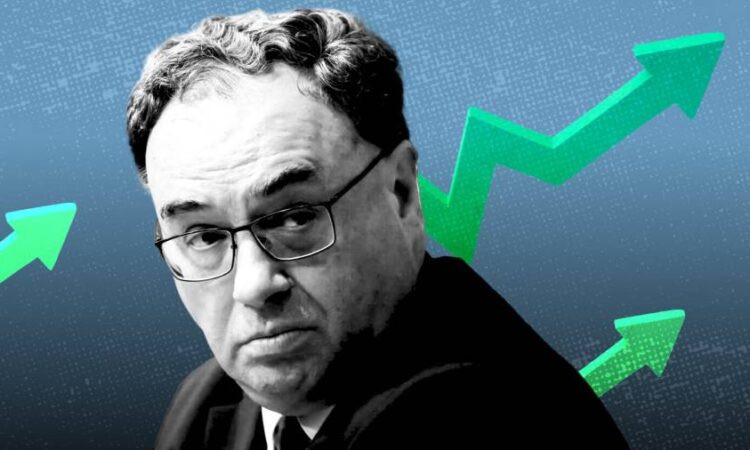
The Bank of England is set to raise its benchmark interest rate to 4.75 per cent on Thursday as it battles an inflation problem that has become more difficult and persistent over the past month.
The expected quarter-point rise will mark the 13th consecutive increase in borrowing costs since the central bank’s Monetary Policy Committee started to push rates higher in December 2021.
The UK’s inflation rate stood at 8.7 per cent in April — higher than most comparable economies and far exceeding the BoE’s 2 per cent target. Financial markets increasingly believe that it will come down only if interest rates rise sharply, hitting mortgage borrowers in ways not seen since the early 1990s.
This means that Britain’s protracted cost of living squeeze is now accompanied by a mortgage “time-bomb”, with hundreds of thousands of households set to face spiralling costs as they come off fixed deals in 2024, when a general election is expected.
The pressure that the state of the economy has placed on Rishi Sunak and his government increased further on Monday when the two-year fixed mortgage rate hit 6 per cent.
BoE governor Andrew Bailey is also in the spotlight over the central bank’s performance in controlling inflation. Over the past six weeks, he has been forced to admit that the bank has underestimated short-term inflation and that its forecasting model is not working properly.
He has also acknowledged that the bank has “lessons to learn” in the conduct of monetary policy, and has ordered a rushed review of its forecasting and communications.
In light of this, traders and economists will be listening to what the central bank says, as much as examining what it does, on Thursday, and will be searching for clues as to how far interest rates will rise.
One of the most important elements in how the bank communicates its decision will be the May inflation figures, which are published on Wednesday.
Economists expect a decline in the headline CPI inflation rate from 8.7 per cent in April to 8.5 per cent on the back of price cuts, especially in diesel prices. But core inflation is expected to remain sticky at 6.8 per cent, far above the central bank’s 2 per cent target.
Strong inflation and wage data over the past month have already transformed the outlook for interest rates in the eyes of financial markets.
Although official figures last month showed that CPI inflation fell from 10.1 per cent in March to 8.7 per cent in April, the rate was far above the BoE’s internal expectations and showed that underlying inflationary pressure was much stronger than hoped. Core inflation, excluding food, energy and alcoholic drinks, rose from 6.2 per cent to 6.8 per cent over the same period.
Wage figures last week compounded the sense that the BoE had failed to understand price setting, with average earnings growing at a near-record pace of 7.2 per cent on an annual basis between February and April. This showed that there was almost certainly a stronger ratchet effect between wages and prices in the UK than in other countries.
Traders betting on the future of the BoE’s benchmark interest rate now expect it to peak at 5.75 per cent by the end of this year, a full percentage point higher than they expected when the MPC last met on May 11.
On the back of the bad data and market moves over the past month, economists have also sharply revised higher their expectations of interest rates and are more than usually confident that the MPC will raise them on Thursday.
Robert Wood, UK economist at Bank of America, said: “All indicators of persistent inflation pressure that the Bank of England said it would monitor closely have surprised on the upside or printed in-line with BoE forecasts.”
Samuel Tombs, chief UK economist at Pantheon Macroeconomics, said that the April wage and price data left the BoE little option but to act. “It’s almost a foregone conclusion that the MPC will hike the bank rate by 0.25 percentage points to 4.75 per cent on Thursday,” he added.
If the rise in interest rates is universally expected, economists, politicians and mortgage borrowers will also want to know on Thursday how much further the central bank thinks it needs to go.
Normally, the BoE would not have a news conference after the June meeting. However, the market movements over the past month have been so large, that they could force Bailey to comment.
He could push back against expectations of further increases if the MPC thinks that financial markets have made borrowing costs too expensive, as he did last November when he said he expected rates to “go up by less than currently priced into financial markets”.
However, this would risk the bank appearing too complacent about inflation and undermining its credibility.
If, by contrast the central bank says little, the absence of guidance could mean that mortgage rates will remain elevated, causing unnecessary financial pain for many households and the government, and it could push the economy into recession.
BoE watchers think the MPC is unlikely to comment on Thursday and will leave in place its current guidance that it will raise rates further if there is evidence of persistent inflation.
Bruna Skarica, UK economist at Morgan Stanley, said she did not “anticipate a forceful pushback against market pricing”, even though in her view BoE officials did not think interest rates needed to rise over 5 per cent.





